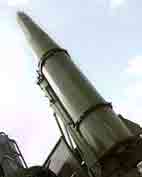Tbilisi accuses Moscow of aggressive policy towards the West
By Temuri Kiguradze
Friday, November 7

Speaking in Moscow, President Medvedev stated that the Russian Federation may place Iskander ballistic missiles in Kaliningrad “to neutralize – if necessary – the [NATO] anti-missile system [in Europe],” place systems which will hinder the operation of the U.S. anti-missile system, parts of which are planned to be deployed in Poland and the Czech Republic, and to give up plans to scrap three Cold War-era nuclear missile facilities. Kaliningrad is a Russian region bordering Poland and Lithuania.
“If anyone in Europe has any illusions, they’d better open their eyes to see what a force they are dealing with, and realize that [in the Russian-Georgian conflict] Georgia was not just an isolated case, an exception,” said Saakashvili, commenting on Medvedev’s statements. “These are not just missiles, these are Iskander missiles – dozens of them were fired in the direction of Georgia,” Saakashvili said. “The Soviet Union was thought to be just threatening, installing [missile systems], but eventually pulling them out; but they are now installing and then firing them [missiles], and we have already seen it happening in Georgia,” he added.
The President continued, “These people chose fierce confrontation and military rhetoric with democratic states from the very beginning; they had this plan from the very beginning; Georgia, unfortunately, appeared at the forefront of this struggle – that is unfortunately our history and geography; we have stopped most of their attacks – they failed to destroy the Georgian state, but they have not given up military games and the blackmailing of the entire world.”
Saakashvili’s statement was supported by the Georgian Minister of Foreign Affairs. Talking to Georgian journalists on November 6, Eka Tkeshelashvili said that “Russia continues to pursue a policy that can only be called aggressive. The allegations made during Medvedev’s speech, and the very concrete aspects of these allegations, including those in respect of neighbouring states, naturally confirm that Russia’s policy has not undergone any change,” she added.
The West was more moderate in its evaluation of Russia’s statements. American military officials stated that the US missiles in Eastern Europe are not directed towards Russia. "These are interceptors and they are designed to protect our European allies as well as the continental United States from an emerging ballistic missile threat from the Middle East," Pentagon spokesman Bryan Whitman told reporters. He also added that Medvedev’s statement will not change plans for anti-missile system deployment in the region.
"I believe the announcement [by the Russian president] is the wrong signal sent at the wrong time," Jens Ploetner, an official spokesman for the German Foreign Ministry said, adding that Germany is in favour of constructive dialogue between Russia and NATO on the U.S. missile shield issue. "We have got used to the fact that Russia growls every now and then," Polish Prime Minister Donald Tusk said at a news conference in Warsaw. "I would not give too much meaning to this declaration." Czech Foreign Minister Karel Schwarzenberg told Reuters news agency that the Russian deployment would worsen the atmosphere for dialogue. Lithuanian President Valdus Adamkus said in a statement that the Russian plan was beyond comprehension.
President Medvedev, in his speech, which was made just a few hours before the announcement of Senator Barack Obama’s victory in the US elections, criticized the USA for its support of Georgia's "barbaric aggression" in South Ossetia. He also blamed the United States for the global financial crisis. "The most powerful one, the economy of the United States ... engineered a tailspin of the financial markets of the whole planet," Medvedev said. "This crisis has acquired a global nature. Certain features of local problems then becoming more common problems is a typical occurrence in the world today."
Anatoly Tsyganok, head of the Moscow-based Military Forecast Centre, as quoted by Russian news agency Ria-Novosti, outlined the reasons for the Russian Federation’s interest in this missile. "The deployment of Iskander missile systems, with a range of 500 km (310 miles) [in the Kaliningrad region] would allow Russia to target the entire territory of Poland and also parts of Germany and the Czech Republic," he said. The Iskander-M tactical system is equipped with high-precision SS-26 Stone 'quasi-ballistic' missiles, reportedly capable of carrying multiple conventional and nuclear warheads. "We could have deployed either strategic bombers or silo-based ballistic missiles in response to the U.S. missile shield in Europe. However, Iskander is the best solution both from an economic and a military standpoint,” said the Russian expert.
